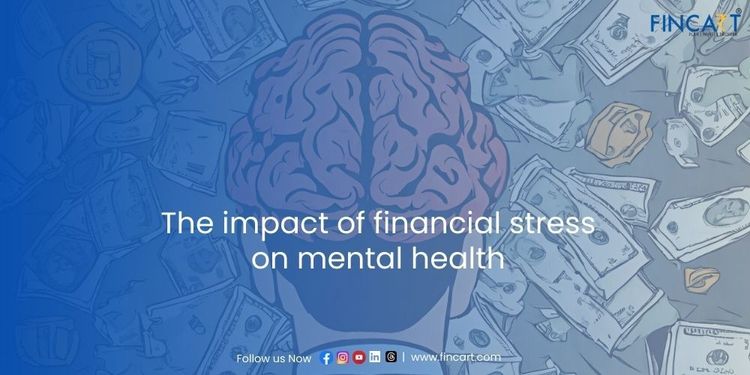Table of Contents
ToggleIn an increasingly uncertain world, the weight of financial stress looms large for many of us. It is a silent battle many of us are fighting, and it’s seemingly getting harder and harder to meet the basic necessities of life, like being able to put enough food on the table and pay rent or bills.
Whether it’s due to job loss, mounting debt, or unexpected bills, money troubles are a common source of stress in our country. It can lead to poor sleep, low self-esteem, mood swings, and reduced energy levels. One might feel frustrated, embarrassed, anxious, or even depressed. But the good news is that it is possible to overcome this financial stress.
Let’s take the first steps by understanding what causes financial stress, and how it impacts mental health, and then we’ll figure out how to ease the emotional burden that it causes, making tough times more bearable.
What is the link between financial stress and mental health?
A person who has to work long hours, or even multiple jobs in order to make ends meet is going to have to make significant sacrifices in their life outside of work. Their social life will take a hit. They won’t get enough time for recreation. They’ll sleep less just to have some more time during the day.
Add in the physical and mental fatigue and burnout and this financial stress will adversely impact their physical and mental health. Another person might be afraid of getting laid off and having no safety net to fall onto, leading to anxiousness. Someone who lives paycheck to paycheck might worry about not having any savings at all, and being one missed paycheck away from a crisis.
There are many examples of how worrying about money can lead to mental health problems, so financial stress and mental health are closely linked and greatly influence our overall well-being and happiness.
Causes of financial stress
Take a look at some factors that can cause financial stress:
Unemployment and job insecurity
Of course, not having a job or a steady income is a major source of financial stress. This can cause one to have low self-esteem. They might feel deeply ashamed and embarrassed of their position in society, and being unable to provide for themselves and their family. It can cause hopelessness about the future and even drive some people to depression.
Financial stress can even affect those who do have a job. They might be fearful of losing their livelihood. We’ve seen with recessions how volatile employment can be, and the pandemic has only worsened that dreaded feeling of an axe hanging over your head. Also, there’s no shortage of competition in India, a fact that compounds the fear of being replaced.
Most who feel this fear live paycheck to paycheck and have no savings to dip into in case they lose their job. This can cause a variety of anxiety disorders.
Debts and other financial obligations
Another significant cause of financial stress is debt. People often take out loans for education, buying homes, starting new business ventures, etc. The problem arises with ineffective management of debt. Even when the rates are low, accumulating debt quickly snowballs. Throw in additional fees and penalties, and paying off these loans becomes a monumental task. One might fall into the trap of taking high-interest loans to pay off their existing loans and get stuck in a cycle of debt.
The weight of these obligations can lead to high anxiety, causing long-term mental health problems.
Economic factors
A lot of people lack a fundamental grasp of financial concepts such as effective debt management, creating and following a budget, investing, saving etc. This lack of financial literacy can cause financial stress, as limited knowledge leads to poor financial decision-making.
Basic needs like food, housing, and healthcare have become considerably more expensive in recent years. The problem is that wages haven’t kept up with these ever-increasing prices. This increasing cost of living is a big cause of financial stress. The portion of money that was saved becomes smaller as the same expenses become larger causing worry and anxiety about the future.
Recession is another cause that adds to stress. During recessions,
- Unemployment rises, as does the fear of losing a job.
- Those who don’t lose their jobs might have their income reduced or wages frozen, making it harder for them to cover their expenses.
- Those with debt find it extremely hard to meet their obligations. Many people have investments in stocks, bonds, or real estate.
- The value of these investments can decrease significantly, impacting long-term financial goals and leading to financial stress.
Impact of financial stress
Anxiety and mood disorders
Constant financial worry can consume a person’s thoughts, severely affecting their overall mental health. Financial stress is known to cause anxiety disorders and depression. It can cast a gloomy shadow, leaving one feeling low, hopeless, and challenged when it comes to focusing or making decisions. This can cause depression. And without the safety of money, feelings of vulnerability and anxiety can arise.
Sleep Disturbances
Being anxious about the future, like worrying over a drop in income or unpaid bills can lead to anxiety. Anxiety in turn can disrupt your sleep pattern and worsen your mental health. Thus a vicious cycle is created. In extreme cases, it can even cause insomnia.
Physical Health Effects
Financial stress doesn’t only impact mental health; it can also lead to physical health issues. It can lead to high blood pressure, heart problems, diabetes, and a weakened immune system. Concerns about healthcare costs may lead people to postpone or avoid seeking medical attention for fear of incurring additional expenses, which further deteriorates health.
Other impacts
- Stress can lead to social withdrawal. It might prompt one to isolate and limit social interactions and not see their friends as often.
- Dealing with financial stress may sometimes lead to the formation of unhealthy habits like excessive drinking, gambling, or overeating as a response to anxiety.
- It can negatively impact job performance and lead to low productivity. Money is one of the leading causes of arguments between couples, so financial stress might lead to relationship struggles.
- Money is one of the leading causes of arguments between couples, so financial stress might lead to relationship struggles.
How to cope with financial stress
Here are some ways to deal with financial stress:
Seeking Help from Financial Advisors
Working with financial advisors can lower the everyday worries that come with handling finances. These professionals can guide debt management, budgeting, and investment strategies.
Budgeting
A clear understanding of the financial situation is needed to make informed decisions to reduce financial stress. This means knowing the full income, all expenses, and savings goals. The outline created by a budget helps in identifying areas where expenses can be cut, or overspending prevented. This is just the first step, sticking to it is equally important.
Building an Emergency Fund
One of the biggest causes of anxiety is uncertainty. “What happens if there’s a medical emergency in the family?”, “What if I get laid off?”, “How am I going to pay rent next month?”. So many questions that can keep one up at night, tossing and turning seemingly endlessly. Setting up an emergency fund solves exactly this. It is a cushion that can ease anxiety and provide peace of mind.
Also Read: How to Build an Emergency Fund and Why It’s Essential?
Conclusion
Financial stress and mental health are deeply intertwined. Stemming from various factors like limited financial knowledge, increasing living costs, job instability, and debt, it can lead to anxiety, mood swings, sleep problems, and even affect your physical health. But, just like any other challenge, it’s important to understand what causes it and how it affects you. The good news is there are plenty of ways to deal with it. You can seek advice from experts, know your finances, and save up for emergencies. Taking these steps can help you manage financial stress and keep your mental and physical health in check.




